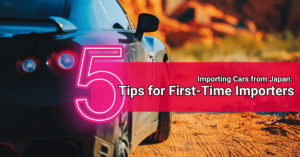Now that the Australian dollar is at its ultimate high, you have all the reasons to put your money where you can get more value–and yes, this includes importing a used car in Australia. With amazing deals flooding the Japanese market on a daily basis, you have every chance to grab a luxurious car for a much lower price.
To guide you as you buy used Japanese cars, below are some of the important pointers and steps in importing a car to Australia.
Why Buy Used Japanese Cars
From robots to innovative gadgets to shopping centers, you can find everything luxurious in Japan. Despite being a premiere tourist spot and a world leader in producing technological equipment, Japan has a great reputation when it comes to selling cheap second-hand vehicles.
This may come to a surprise, especially since the word “cheap” is the last thing you can use to describe Japanese cars, but thanks to the Japanese’ practice of upgrading their cars every 3 years, thousands of used Japanese cars are added to the market. This is definitely great news if you are planning to buy used Japanese cars. Not only are you guaranteed to find a great bargain, but you can also meticulously inspect the vehicle’s quality through car auction tools and sheets.
How to Import a Japanese Car in Australia
- Choose the type of import you need
- Import for vehicles manufactured before January 1, 1989 is used for old vehicular models that were produced before 1989.
- Personal Import apply to those who are migrating to Australia who own a vehicle for at least 12 months. For this type of import, you must own a driver’s license and the car must be parked at a garage near your home.
- Import for a luxury car from Japan is a more practical choice since the units are sold at a cheaper price. However, there is a limit to the number of luxury cars you can import.
- Import for a car unavailable in Australia is subject for approval and must be enlisted in the Specialist and Enthusiast Vehicle Scheme (SEVS) Register.
- Import for exported Australian cars that is subject to re-importation specifically applies to cars that have been brought inside Japan for an extended trip in the country.
- Submit an application for import approval
- Prepare the vehicle
- Obtain custom clearance
- Get quarantine clearance
- Meet specific conditions for import approval
- Register the Car
Before importation, you must first submit an application letter since all vehicles that are subject for importation require approval. After selecting the type of import you need, you must fill in an application form, along with an addendum. These legal papers can also be sent via email or snail mail. Once approved, you will receive a letter that specifies all the conditions relevant to the importation.
To eliminate possible quarantine problems, steam clean your vehicle and remove air conditioning gas if necessary. Then, you must pay for a shipping fee, which is highly dependent on the type of vehicle you wish to ship to Australia.
It’s impossible to buy used Japanese cars without obtaining custom clearance. To get vehicle clearance, you must lodge an import declaration to the customs. You can either do this independently or with the help of a customs broker. Once the car arrives in Australia, you must prepare your budget for GST, customs duty and luxury car tax (if you’re importing a luxury car).
To obtain a clearance from the quarantine, you must submit the vehicle’s specific quarantine entry time and set up a schedule for inspection. If the car does not meet the quarantine requirements, you would have to clean the car again and set up another inspection, which can be costly.
Car modifications may be necessary to obtain import approval. These alterations may include, but is not limited to, brake fluid replacement, seat belt replacement, complete car service, gas headlight removal and changes on the driving orientation of the vehicle.
Lastly, once the vehicle is cleared, you need to register it and obtain insurance.
Importing a vehicle to Australia is a rewarding experience, especially if you consider cost-efficiency and quality. If want hassle-free transactions as you buy used Japanese cars, contact us and we’ll make sure you’ll get the best deals.



